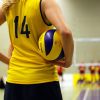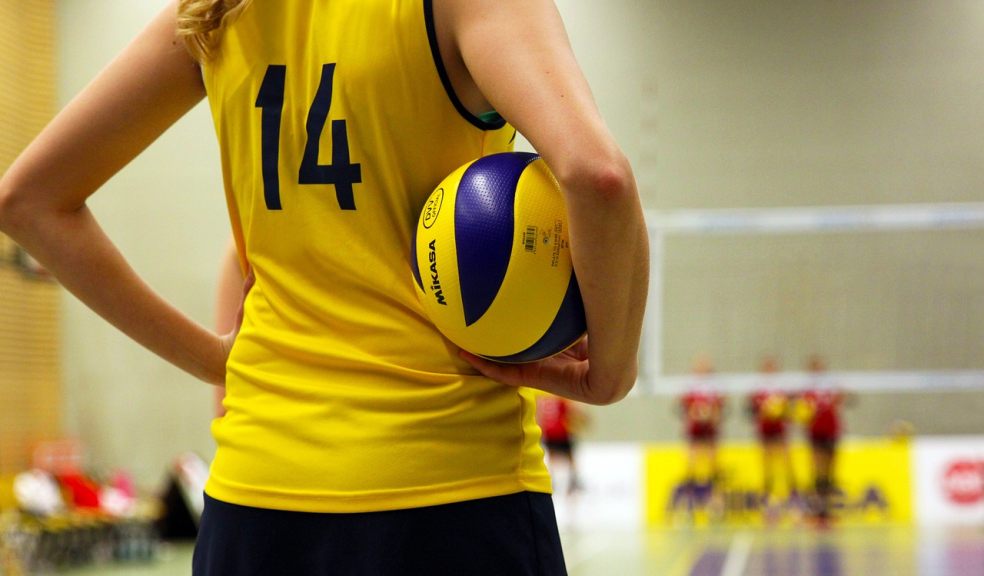
The BTEC Sports Experience: More Than Just a Course
Studying BTEC Sport isn't just about getting a qualification—it's about living and breathing sports. You'll analyze real matches, design workouts, and maybe even discover your calling as a future sports star or industry pro!
Remember when you watched your favorite athlete pull off an incredible move and thought, "How did they do that?" Well, after BTEC Sport, you'll know. You'll understand the science behind the swerve of a football, the psychology of a comeback, and the planning behind a perfect training session.
So, are you ready to start your BTEC Sport? In this game, everyone's a winner. Whether aiming for that Distinction* or just looking to learn more about the sports you love, BTEC Sport has something amazing in store.
A Revision Guide For BTEC Sport GCSE: Sport Course Structure
Let's say you're starting a completely new sports league. You must have a good plan, right? These are the steps of the BTEC Sport course. It's divided into different units, each of which is an important part of your league.
When you pass these units and the exam, you will get the BTEC Tech Award in Sport. The BTEC Tech Award is a Key Stage 4 BTEC meant for students ages 14 to 16 to study in school alongside GCSEs. But before you start, make sure you have enough information about GCSE point score to avoid any mistakes.
Core Units
These are like the training sessions for understanding the human body and fitness essentials. Everyone takes these.
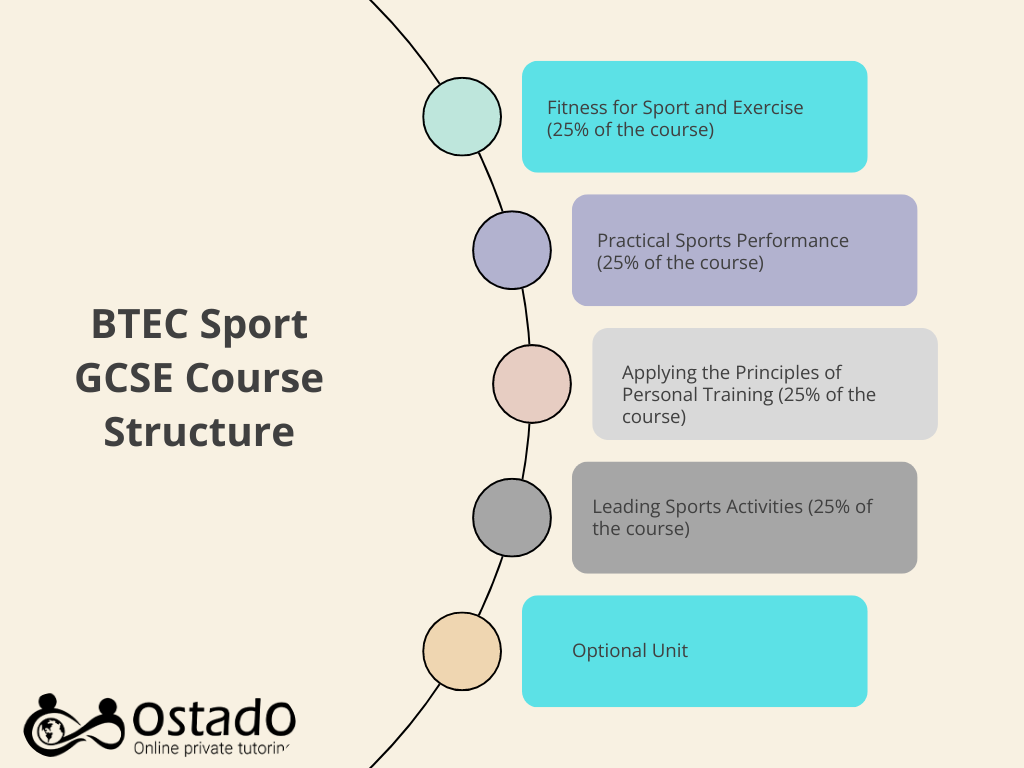
Here's how it works:
Fitness for BTEC Sport and Fitness (25% of the Sport course): This is your introduction to the science behind peak performance and Fitness. You'll dive into the 11 components of fitness, from cardiovascular endurance to flexibility. Ever wondered how Mo Farah trains for a marathon? You'll learn about different training methods here!
Practical Sports Performance (25% of the BTEC Sport course): You'll participate in two BTEC sports. Maybe you'll perfect your tennis serve or master your football tactics. It's not just about playing - you'll also analyse rules, regulations, and scoring systems.
Applying the Principles of Personal Training (25% of the BTEC Sport course): You'll set SMART goals, plan training sessions, and track progress. Ever used a heart rate monitor? You will now!
Leading BTEC Sports Activities (25% of the Fitness Sport course): As a sports coach or PE teacher, you will learn to inspire others and change tasks for different skill levels.
Optional Units: Here, you pick your team based on your interests. Want to focus on coaching? Or maybe sports psychology grabs your attention? It’s your call!
Yearly Breakdown
Year 10: You'll jump into units about practical sports skills and fitness for BTEC sport and Fitness.
Year 11: This year is about applying principles of personal training and leading sports activities. Think of it as moving from being a player to taking on a coach’s role.
Suggest To Read: "Equivalence" in GCSE grades means how well the new number grades (9–1) and the old letter grades (A–G)* match up.
Key Components of BTEC Sport GCSE: Practical vs. Theoretical
Now, let’s dig into the nitty-gritty of what you’ll be doing for the Revision Guide:
Practical Aspects BTEC Sport GCSE: In Unit 2, you'll be assessed on your skills in both sports—football's dribbling, shooting, and tactical play, and swimming's strokes, turns, and speed. You must also demonstrate that you know the rules and can evaluate your work to identify areas for growth and improvement in your skills.
Theoretical Aspects of BTEC Sport GCSE: Some units, like Unit 1's "Fitness for BTEC Sport and Exercise," teach theory and practice. Also, you will learn the difference between aerobic and anaerobic activity, how to find your heart rate, and what these numbers indicate about your fitness level.
Scoring Points: Assessment and Grading
Here is the BTEC sport GCSE assessment and grading:
BTEC sport GCSE Assessment
Most of your assessment will be through Sport coursework and practical activities. For example, in Unit 3, you’ll plan and document a personal training program, track your progress, and reflect on what you’ve learned. This is graded internally by your teachers.
The BTEC Sport uses a mix of assessment methods to showcase your skills:
External Assessment (25%)
One-hour online exam for the Fitness for Sport and Exercise unit.
Multiple choice, short answer, and extended writing questions.
Pro tip: Practice past papers to get comfortable with the format!
Internal Assessment (75%)
Assignments and practical assessments for the other three units.
These could include training logs, video evidence of your sports performance, or lesson plans for coaching sessions.
You'll receive feedback and have 15 working days to improve your work before final submission.
BTEC Sport GCSE Grading
Here's the data:
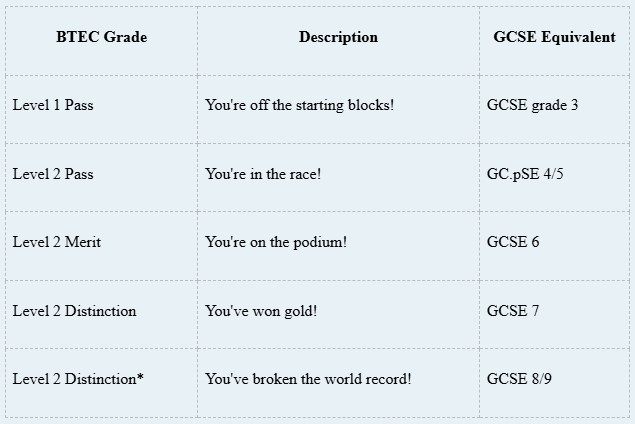
And here's the best part - you can retake the GCSE exam! Submit your Sport coursework, get feedback, and then have 15 days to level up your game. Even the exam can be retaken in Year 11. Talk about a second wind!
Dont Miss Reading: This guide answers the questions of what are predicted GCSE grades and how they are determined:
How To Revise BTEC Sport GCSE?
Ready to ace your BTEC Sport GCSE? Let’s make the revision Guide not just effective but also enjoyable. We have some killer tips to help you smash those exams and assignments.
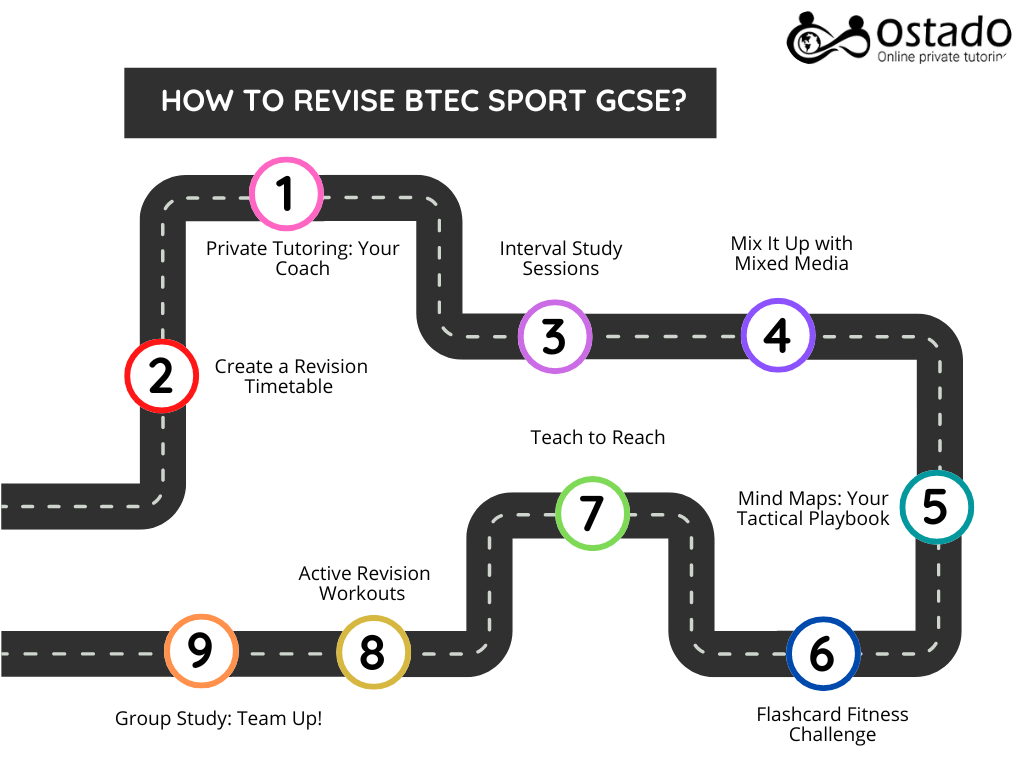
1- Private Tutoring: Your Coach
They'll provide one-on-one guidance tailored to your strengths and weaknesses.
You can get immediate feedback and ask questions in real-time.
Keep in mind that, just like in sports, regular practice is very important. You can use a mix of these methods to find the one that works best for you.
2- Create a BTEC Sport GCSE Revision Guide Timetable
First things first, get yourself a revision Guide timetable. It’s like a game plan. Break down your revision Guide into manageable chunks and spread them out over the weeks leading up to your exams.
Trust me, it’s way less stressful than cramming the night before.
Example: Let’s say you’ve got a month before your exam. Week 1 could focus on Fitness for Sport and Exercise, Week 2 on Practical Sports Performance, etc. Don’t forget to include breaks – you’re not a machine!
3- Interval Study Sessions
Consider your Sport revision Guide like High-Intensity Interval Training (HIIT) for your mind:
25-minute focused study sprints
5-minute active recovery breaks (stretch, jog in place, or do quick exercises)
Repeat for 4 "sets": This keeps your mind sharp and your body energized. You wouldn't run a marathon without breaks, right? The same goes for studying!
4- Mix It Up with Mixed Media
Who says studying has to be all reading and writing? Mix up your revision Guide with videos, podcasts, and interactive quizzes.
For instance, find a video explaining the cardiovascular system, then switch to a podcast about sports nutrition. It’s like cross-training but for your brain. This way, you engage different senses and retain information better.
5- Mind Maps: Your Tactical Playbook
Create colorful mind maps for each topic like you're drawing up game plans:
Start with the main concept in the center (e.g., "Energy Systems")
Branch out with sub-topics (Aerobic, Anaerobic lactic, Anaerobic lactic)
Add key facts, examples, and diagrams to each branch
6- Flashcard Fitness Challenge
Turn the revision Guide into a workout with flashcard drills:
Create flashcards for key terms, concepts, and equations
Set a timer for 2 minutes
See how many you can correctly answer
Try to beat your "personal best" each time
7- Teach to Reach
Pretend you're the coach now. If you can teach it, you know it!
Explain concepts to a study buddy, family member, or even your pet
Use sports analogies to make it stick (e.g., compare the circulatory system to a team's supply lines)
8- Active Revision Guide Workouts
Get physical with your revision Guide:
Create a "Revision Circuit Training" - assign different exercises to different topics (e.g., do squats while reciting muscle groups)
Use a basketball to bounce as you recite key facts - the rhythm can help with memorization.
Take a walk while listening to recorded notes.
9- Group Study: Team Up!
Studying with friends can make the revision Guide more enjoyable and effective.
Form a study group with classmates.
Each person can take turns explaining different topics, and you can quiz each other on key concepts.
Organise group training sessions where you can practice skills, discuss training principles, and give each other feedback.
10- Exam Day Simulation
Recreate exam conditions:
Set up a quiet space, like you're stepping onto the field
Use past papers and time yourself strictly
Wear what you'll wear on exam day (your "uniform")
11- Spaced Repetition: The Marathon Approach to Memory
You wouldn't run a marathon without training over time, right? The same goes for your brain. Spaced repetition is your endurance training for long-term memory:
The Leitner System: Use this flashcard method to review challenging concepts more frequently. It's like giving your weak spots extra gym time!
The 24-Hour Rule: Always review new material within 24 hours. This can increase retention by up to 80%!
Monthly Review Sessions: Schedule monthly reviews of older topics. It will help you maintain your fitness level between sports seasons.









